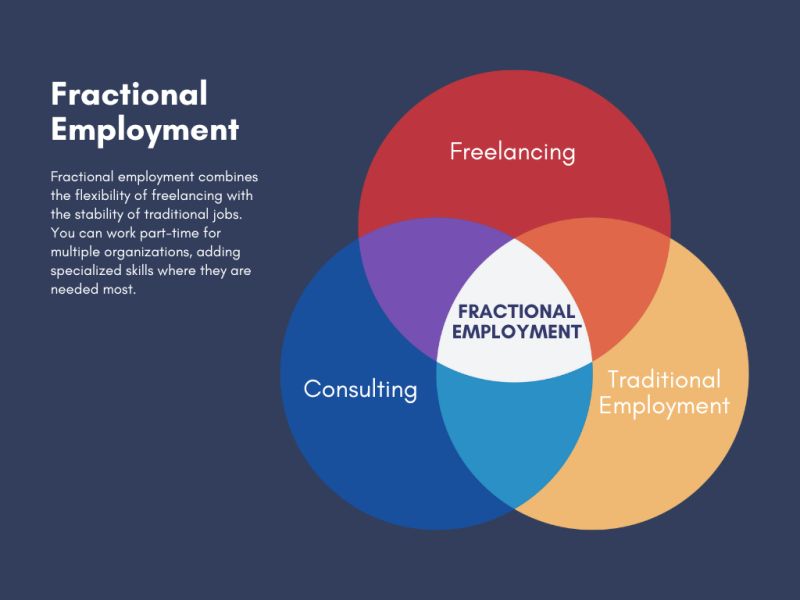
The Rise of Fractional C Level Roles
The UK is experiencing a rapid rise in the use of fractional executives, as businesses seek flexible and cost-effective leadership solutions for key roles such as Chief Financial Officers (CFOs), Chief Marketing Officers (CMOs), Chief Technology Officers (CTOs), and other senior positions. Traditionally, companies relied on full-time executives for strategic leadership, but changing economic conditions, evolving work models, and increasing demand for specialized expertise have driven a shift toward part-time leadership solutions.
This approach allows companies to access high-level strategic input without the long-term financial commitment of hiring full-time executives. Start-ups, scale-ups, and SMEs, in particular, are turning to fractional executives to gain access to experienced leadership at a fraction of the cost, helping them scale operations, attract investment, and navigate complex business challenges.
Why Fractional Roles Are Gaining Traction
Fractional leadership is not a new concept—investment firms have leveraged fractional specialists for years, particularly for due diligence and financial analysis. However, its adoption has accelerated across industries due to several key factors:
- Cost Efficiency – A full-time C-suite executive can command a six-figure salary, plus bonuses, pensions, equity, and other benefits. For businesses with constrained budgets, this can be a significant financial burden. Fractional executives allow companies to pay only for the expertise they need, often at a significantly lower cost, while still benefiting from strategic guidance.
- Specialist Expertise on Demand – Many businesses face complex strategic challenges that require senior-level expertise, but not on a full-time basis. A fractional executive can provide critical leadership for financial planning, marketing strategy, or digital transformation for a few days per month, rather than requiring a permanent role.
- Post-COVID Work Shift – The pandemic caused a fundamental shift in how executives approach work, with many opting for portfolio careers instead of full-time employment. This has expanded the availability of highly skilled professionals who now offer their expertise on a fractional basis, allowing businesses to tap into a wider talent pool.
- Economic Uncertainty & Market Volatility – Given the current economic climate, companies are hesitant to take on long-term financial commitments. Hiring fractional executives allows businesses to remain agile, scaling leadership support up or down based on immediate needs, rather than committing to full-time salaries.
- Technology & Remote Work – Advances in digital collaboration tools have made it easier for executives to work with multiple companies simultaneously. Remote and hybrid work models have removed geographical constraints, allowing companies to hire fractional executives regardless of location.
Full-Time vs. Fractional: The Cost & ROI Factor
The financial argument for fractional executives is compelling. In the UK, a full-time CFO typically earns between £150,000 and £250,000 per year, excluding bonuses and stock options. Add in pensions, benefits, and potential equity stakes, and the cost of hiring a full-time executive can be prohibitive for smaller companies.
By contrast, a fractional CFO might charge £1,500–£3,000 per day, working only a few days per month. This means a business can gain access to high-level financial strategy and leadership for as little as £50,000 per year—potentially saving six figures compared to hiring a full-time executive. Similar cost savings apply to other C-suite roles, making the fractional model highly attractive.
Beyond cost savings, fractional executives often deliver a higher return on investment (ROI). Because they are typically experienced professionals with years of industry knowledge, they can execute faster, avoid costly mistakes, and provide targeted solutions without a lengthy learning curve. This results in more efficient decision-making and quicker strategic execution.
The Future of Fractional Leadership in the UK
The demand for fractional executives is expected to grow significantly in the coming years. Industry forecasts predict that by 2030, up to 30% of all C-suite roles in the UK could be fractional, as businesses continue to embrace flexibility in leadership.
Several industries are leading the charge in adopting this model:
- Tech Start-ups & Scale-ups – Fast-growing companies need expert guidance on finance, marketing, and technology but may not have the capital to afford full-time executives.
- Private Equity & Venture Capital – Investors are increasingly bringing in fractional leaders to provide due diligence, improve portfolio performance, and prepare companies for exits.
- Professional Services & Consulting – Companies in these sectors benefit from having senior leadership available for client-facing roles without long-term overhead costs.
The trend toward fractional leadership is only set to accelerate as businesses seek to remain agile, cost-efficient, and competitive in a rapidly evolving market. Whether for start-ups needing expert guidance, mid-sized businesses looking to optimize operations, or investment firms conducting due diligence, fractional executives are proving to be a powerful solution for driving business success.
#FractionalLeadership #CFO #CMO #CTO #BusinessGrowth #StartupSupport #InvestmentStrategy #PortfolioCareers #FutureOfWork #AgileBusiness #CostEfficiency #ExecutiveHiring #ScaleUp #RemoteWork #LeadershipOnDemand #BusinessStrategy #UKBusiness





